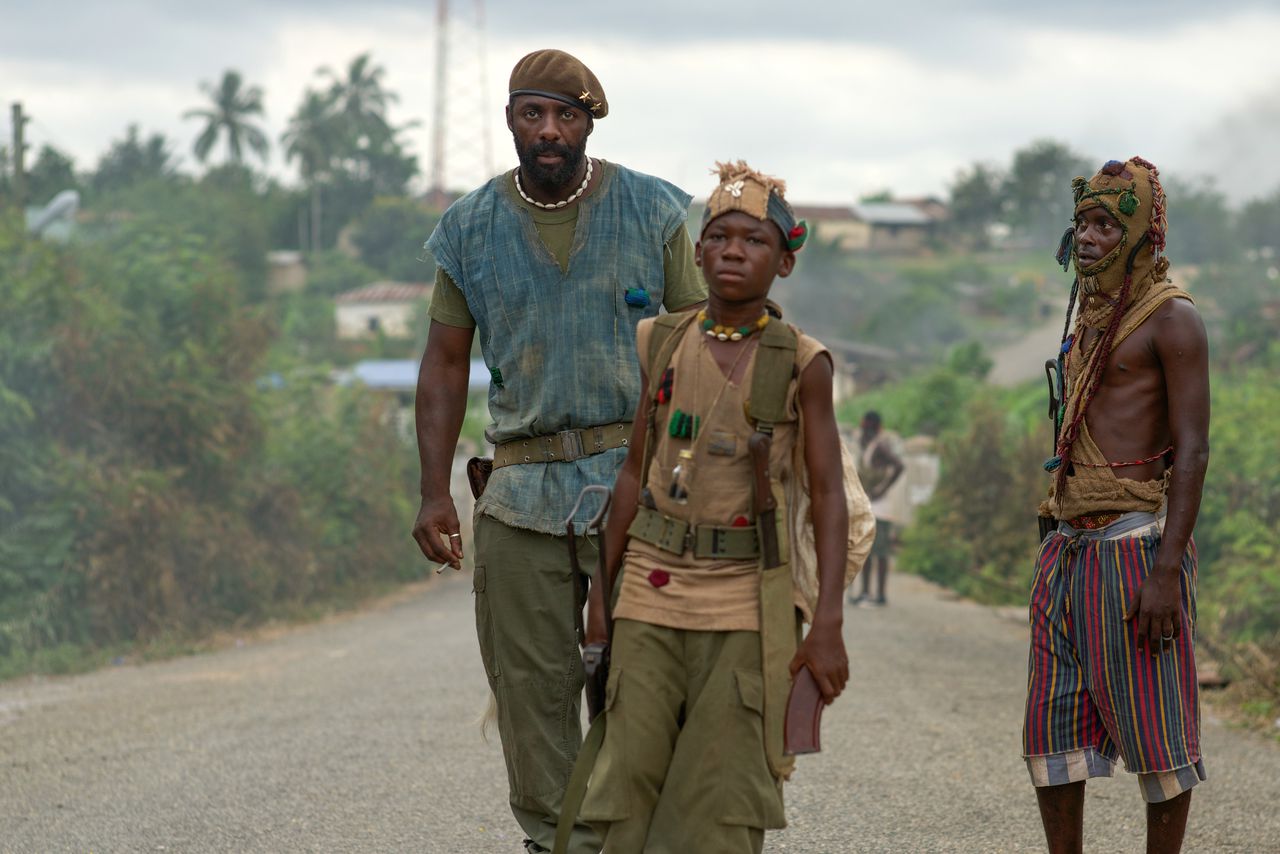By Chlotrudis Independent Film Society
Rating: 5 cats
Director: Cary Joji Fukunaga
Starring: Abraham Attah | Anna K. Abebrese | Emmanual Affadzi | Idris Elba | Kobina Amissah-Weddey

Country: united_states
Year: 2015
Running time: 137
IMDB: http://www.imdb.com/title/tt1365050/combined
Jason says: “Horror is assumed going into a film like BEASTS OF NO NATION; the audience knows about child soldiers and African chaos on a factual level and has perhaps steeled itself for that. Filmmaker Cary Joji Fukunaga never missteps there, but where many would make the whole production ugly, he constantly reminds us that Africa is beautiful, twisting the knife just a bit more.
“That beauty can exist in the middle of a country at war with itself, such as the unnamed one where Agu (Abraham Attah) lives at the start. His mother (Anna K. Abebrese) is religious, his father (Kobina Amissah-Sam) is a teacher and community leader, his big brother (Francis Weddey) is girl-crazy, and his best friend Dike (Emmanuel Affadzi) may be short, but he’s funny and extroverted. When the buffer zone where his village is located shrinks to nothing, he’s barely able to escape into the forest, and it’s not long before a group of rebels finds him. Their Commandant (Idris Elba) has charisma and a way of turning kids into fierce soldiers – witness Strika (Emmanuel Nii Adom Quaye) and a second-in-command (Kurt Egyiawan) barely out of his teens, and no issue killing those that don’t get with the program.
“What Fukunaga is trying to do with the start isn’t exactly a mystery, but it’s no less effective for being transparent. Heck, those in a North American audience may watch the scenes of kids running around their neighborhood, making their own entertainment instead of plopping down in front of a screen, and getting smiled at by a friendly cop, and feel a bit nostalgic, never mind that the ‘cop’ is an ECOMOD peacekeeper. As much as Fukunaga doesn’t hide the danger, there’s something about this place that the audience doesn’t just see as the best an African kid could hope for but wants for itself, and seeing that admittedly precarious tranquility ripped away works.
“The forest Agu initially escapes into is even more primally Edenic, and Fukugana never loses sight of that. Acting as his own
cinematographer, he goes for a sharp image where the greens of the forest are much brighter and livelier than those of the military uniforms that the rebels have fashioned. Every image seems to have been fashioned with purpose, with some quite elaborate: There is a sequence where the rebels are attacking a village and Fukunaga pulls back to an eye-in-the-sky view to present violence happening in every quadrant of the screen, bringing to mind a swarm of ants, while other battles will show the modern weaponry of government forces pounding them like exterminators. The filmmakers use clarity and confusion with purpose, avoiding the balancing point where an action scene is thrilling to capture when it’s terrifying or clinical.
“You can see the thought processes that go into these decisions, and that may be somewhat deliberate. Fukunaga’s script recognizes the importance and power of ritual in these situations (as, presumably, does Uzodinma Iweala’s source novel) and it’s always a tug-of-war between wanting to demonstrate this as a visceral experience and presenting it to the rational part of a viewer’s mind, with the filmmakers striking a fair balance here. It’s not difficult at all to get caught up in certain moments even as the presentation is firmly signaling that something planned and pivotal is going on, unless one is completely jaded. Agu’s narration plays into this; it’s a mixture of a child swept up and carried along and the maturity to recognize the evil that he is caught up in.
“Whether narrating or playing things out on-screen, young Abraham Attah’s performance is very strong. The good kid of the opening is immediately engaging but has a hint of the dark side that can be exploited, and he does a good job of not just bringing it out but showing it shoving Agu’s better nature aside, even if the harsh lessons he has learned haven’t completely obliterated his child’s view of the world yet. He’s joined by rock-solid performances up and down the board; with Emmanuel Nii Adom Quaye worth a little extra attention for what a forceful personality he gives Strika with very little dialogue. Idris Elba gets plenty to say as the Commandant, and delivers a performance just as memorable as one might expect. One thing that’s impressive about this one is that, while he’s plenty charismatic and forceful, there’s always a hint that his material might not work so well on adults – that he is a leader of boys, not of men.
“(Speaking of dialogue, although most of the film is in English, it is heavily accented enough that those watching it at home may want to turn on the subtitles, as there are few if any in the theatrical presentation.)
“The circumstances of its initial release will probably get more discussion than what a fine film it is, just as they have made its
theatrical release very limited. That’s doubly unfortunate, as the sights and sounds of this one are top-notch – it’s a big movie about a horrifying subject, and deserves a chance to be seen as grandly as possible. 5 cats
“Seen 20 October 2015 in Landmark Kendall Square #8 (first-run, DCP)”
